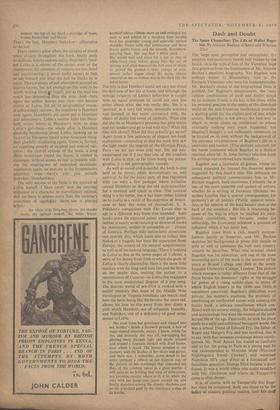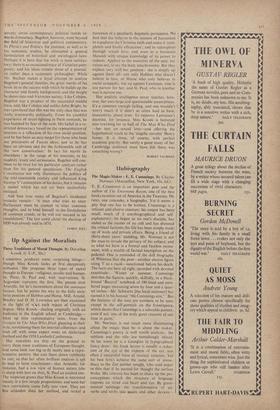Dash and Doubt
THE large eyes, perceptive and melancholy, the sensitive and passionate mouth half-hidden by the beard—it is the typical face of the Victorian Sage that greets us from the frontispiece of Mr. Alastair Buchan's excellent biography. Yet Bagehot was perhaps nearer to Bloomsbury than to the Eminent Victorians who were his contemporaries. Mr. Buchan's choice of the biographical form is justified, for Bagehot's temperament, the 'very curious combination of dash and doubt' noted by an intimate friend, is the key to his ideas, while his personal position at the centre of the close-knit world of the mid-Victorian intellectuals provides a starting-point for the exploration of that whole society. Biography is not always the best way in which to write about an intellectual to whom externally nothing very much happened, but Bagehot's thought is not sufficiently systematic to be treated on its own without the background of the personal circumstances of Bagehot's life as a journalist and banker. (This perhaps accounts for the harsh treatment which Bagehot as a thinker received when Mr. St. John Stevas's selection from his writings was reviewed here recently.) Bagehot was a journalist of genius, whose in- terests extended far beyond the financial sphere suggested by this book's title. His influence on subsequent political commentators has, as Mr. Buchan suggests, been enormous. Certainly, he is one of the most quotable and quoted of writers, whether he is writing of literature (Dickens 'de- scribes London like a special correspondent for posterity') or of politics (Public opinion nowa- days is the opinion of the bald-headed man at the back of the omnibus'). His life is interesting be- cause of the way in which he reached his intel- lectual convictions, and because, under his editorship, the Economist achieved a position of influence which it has never lost.
Bagehot came from a rich, mainly noncon- formist family in Somerset, and Mr. Buchan sketches his background in prose that recalls in style as well as substance the lush west country scenery he describes. What was unusual about Bagehot was his education, and one of the most interesting parts of the book is the account of his years at Bristol College and then at the newly founded University College, London. The picture which emerges is rather different from that of the fierce battles for dissenters' rights or the struggle for power of a rising middle-class, in terms of Which English history in the 1830s and 1840s is sometimes conceived. Bagehot's difficulties were private: his mother's madness, the problem of combining an intellectual career with running the family bank, a delicate constitution which con- flicted with his natural energy, the religious doubts and questionings that were the essence of the intel- lectual life of the age. Externally, he took his place easily in a solid and cultivated bourgeois world. He was a school friend of Edward Fry, the father of Roger and Margery Fry, and was involved, that is to say, with that immense cousinage whose ramifi- cations Mr. Noel Annan has traced so carefully and so far. On going to Paris as a young man he was recommended to Madame Mohl (Florence Nightingale's friend 'Clarkey') and witnessed Napoleon III's coup d'etat as a fascinated and fastidious spectator. George Eliot became a great friend. It was a world where one could breakfast with Mr. Gladstone and where de Tocqueville came in after dinner.
It is, of course, with de Tocqueville that Bage- hot must be compared. Both can claim to be the father of modern political studies; both felt deep
anxiety aodut contemporary political trends to- wards democracy. Bagehot, however, went beyond the field of historical and political commentary. In Physics and Politics, for instance, as well as in his economic studies, he attempted a general formulation of historical and sociological laws. Perhaps it is here that his work is least satisfac- tory; there is an occasional trace of Victorian pom- posity, and his ideas remain those of a journal- ist rather than .a systematic philosopher.. While M r. Buchan makes a loyal attempt to analyse Bagehoes general theories, the great merits of his book- lie in the success with which he builds up the character and family background, and the insight he shows into mid-Victorian society. Like Cobden. Bagehot was a product of the successful • middle class, and, like Cobden and unlike John Bright, he was convinced that this was the only class that was really trustworthy politically. From his youthful experience of street-lighting in Paris onwards, he was haunted by fear of the mob. His belief in a re- stricted democracy based on the representation' of interests is a reflection of his own social position, and he has been an easy target for those who hunt out precursors of Fascist ideas, just as. he has been an obvious idol for the fashionable cult of the 'new conservatism.' In fact his merits lie elsewhere : in the range of his interests, in his modesty. irony and seriousness. Bagehot will con- tinue to be read for his particular analyses rather than for his general speculation. The • English Constitution not only illuminates the politics of the mid-nineteenth century and influenced King George V'S conception of his duties,•but it remains a model which has not yet been stic6essfuliy, imitated.
And how truemany of Bagehot's incidental remarks remain : 'A man who tries to enter Parliament must be content to utter common thoughts, and to bind himself to the formularies of common creeds, or he will not succeed in his candidature.' The last word about the election Of 1959 was already said in 1874.
JAMES JOEL







































 Previous page
Previous page